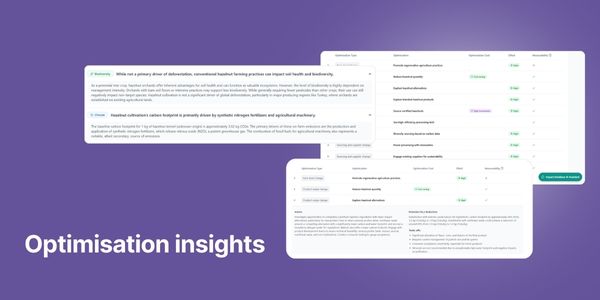Dolor Lorem ipsum dolor sit consectetur.
20.12.2020 by inoqo
Lorem ipsum dolor sit amet, consectetur adipiscing elit. Quis odio neque elit eu quamullam corper commodo ac a. Tortor, volutpat mi egestas urgelementum.
Going beyond product category-level data
Aligned with the 1.5 °C goal

inoqo's Product Impact Assessment platform starts with assessing the climate footprint of food and beverage products by analysing the details on their packaging, such as:
The inoqo Product Climate Footprint (PCF) Assessment Solution is the core engine for highly scalable impact calculations. The solution is aimed at (1) large F&B retail customers who aspire to assess, optimize and report the impact of individual products and whole assortments, with the goal of reducing their negative impact over time, as well as (2) on individual consumers who want to compare the carbon footprint of F&B products as they purchase them. The inoqo solution is tailored to meet F&B industry customers where they currently are in terms of data availability. This means that publicly available product information is enough to start estimating the impact of products.
The inoqo platform (the data management frontend) is built on top of the backend calculation engine and will support customers to ingest further non-public product information, for the purpose of refining the calculation results, find insights on where the largest optimisation potential can be found and track changes (i.e. impact improvements) overtime. The platform leverages cutting-edge technology including a comprehensive LCI (life cycle inventory) data library to accurately evaluate the sustainability of products in line with the latest scientific advancements. Additionally, the platform can be easily integrated into existing systems and processes, allowing retailers to quickly and efficiently assess the sustainability of their product assortment and make informed decisions to improve their environmental impact and communicate it to the consumer.
The methodological framework for “Climate” is the automated conduction of life cycle assessments (LCA) based on the ISO standards 14040/14044 (International Standards Organization 2006). Additionally, further guidance is taken from the Product Environmental Footprint (PEF) (European Commission 2021), including default data on transport modes and distances, as well as impacts arising from storing the products in distribution. Since the F&B retail industry belongs to the Forest, Land, and Agriculture (FLAG) sector, elements of the GHG Protocol Land Sector and Removals Guidance draft (World Resources Institute and World Business Council for Sustainable Development) have been incorporated, enabling the inoqo platform to report an SBTi proxy value.
inoqo Blog

20.12.2020 by inoqo
Lorem ipsum dolor sit amet, consectetur adipiscing elit. Quis odio neque elit eu quamullam corper commodo ac a. Tortor, volutpat mi egestas urgelementum.

20.12.2020 by inoqo
Lorem ipsum dolor sit amet, consectetur adipiscing elit. Quis odio neque elit eu quamullam corper commodo ac a. Tortor, volutpat mi egestas urgelementum.

20.12.2020 by inoqo
Lorem ipsum dolor sit amet, consectetur adipiscing elit. Quis odio neque elit eu quamullam corper commodo ac a. Tortor, volutpat mi egestas urgelementum.

19.12.2025
by inoqo
. von inoqo
Optimisation Insights, powered by expert knowledge and cutting edge LLM technology, translate complex sustainability data into a clear, practical toolkit for reducing emissions from category-specific hotspot ingredients. Instead of asking busy category and product teams to “just use less” of a problematic ingredient, each insight pinpoints a concrete lever: reformulate a recipe, switch an origin, support a farm-level transition or tighten inventory to cut avoidable waste. For retailers, this means you can move from generic climate commitments to a targeted action plan that tackles the biggest drivers of emissions in your avocado range, your nuts and seeds portfolio, your dairy, your meat substitutes and beyond.
.jpg)
8.10.2025
by inoqo
. von inoqo
The Empowering Consumers Directive (EmpCo) targets greenwashing by requiring every environmental claim to be clear, specific and provable. Labels such as “eco-friendly,” “green,” “climate friendly,” or “biodegradable” cannot be used on their own. They are only acceptable when backed by recognised, excellent environmental performance.
.jpg)
18.9.2025
by inoqo
. von inoqo
With an increasing focus on well-being, consumers today are elevating protein to a key role in modern diets. "High-protein" has become an influential buzzword, significantly swaying purchasing decisions as people actively seek to boost their intake.
